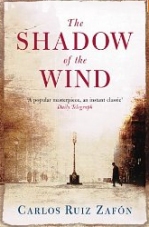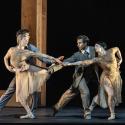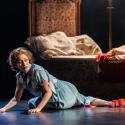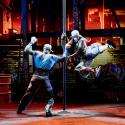Carlos Acosta is not just a superstar dancer with the Royal Ballet and around the world, he is an avid reader - and indeed writer. After writing his autobiography No Way Home, he has also scripted dance shows and is now writing a novel.
Unsurprisingly, his thoughts and memories turn to his native Latin America - to the Chilean Roberto Bolaño (1953-2003) and the Spaniard Carlos Ruiz Zafon (born 1964) - when he chooses what next to read, a marked contrast with the heroes of European ballet dramas such as Swan Lake, Giselle and the Chekov-inspired Winter Dreams that he dances this autumn at Covent Garden. Now 37, Acosta is widening his view of life and increasingly focusing on what he can do in his homeland, Cuba, a powerhouse of world dance that - dominated by the nonagenarian Alicia Alonso - increasingly looks as if it needs new leaders.
1. What are you reading at the moment?
I'm reading Roberto Bolaño's 2666 at the moment. To be honest I've been reading it for some time - it's very long and the depth of the characters and the nature of the narrative mean that you need to pay the book a lot of attention. It's a great journey through different periods of time and different locations mostly in Latin America. Bolaño had been recommended to me by a friend and I am so pleased to have had the introduction.
 [Extract: 2666 by Roberto Bolaño (Picador 2009)]
[Extract: 2666 by Roberto Bolaño (Picador 2009)]
In the morning Espinoza gave the clerks and the guards and the waiters at the hotel some of the rugs and serapes he’d been accumulating. He also gave rugs to the two women who cleaned his room. The last serape - a very pretty one, with a red, green and lavender geometric motif - he put in a bag and told the clerk to have it sent up to Pelletier.
“An anonymous gift,” he said.
The clerk winked at him and said he would take care of it.
When Espinoza got to the crafts market she was sitting on a wooden bench reading a pop magazine full of colour photos, with articles on Mexican singers, their weddings, divorces, tours, their gold and platinum albums, their stints in prison, their deaths in poverty. He sat down next to her, on the curb, and wondered whether to greet her with a kiss or not. Across the way was a new stall that sold little clay figurines. From where he was Espinoza could make out some tiny gallows and he smiled sadly. He asked the girl where her brother was, and she said he’d gone to school, like every morning.
A woman with very wrinkled skin, dressed in white as if she were about to get married, stopped to talk to Rebeca, so he picked up the magazine, which the girl had left under the table on a lunch box, and leafed through it until Rebeca’s friend was gone. A few times he tried to say something, but he couldn’t. Her silence wasn’t unpleasant, nor did it imply resentment or sadness. It was transparent, not dense. It took up almost no space. A person could even get used to silence like this, thought Espinoza, and be happy. But he would never get used to it, he knew that too.
When he got tired of sitting he went to a bar and asked for a beer at the counter. Around him there were only men and no one was alone. Espinoza swept the bar with a terrible gaze and immediately he saw that the men were drinking but eating too. He muttered the word fuck and spat on the floor, less than an inch from his own shoes. Then he had another beer and went back to the stall with the half-empty bottle. Rebeca looked at him and smiled. Espinoza sat on the sidewalk next to her and told her he was going home. The girl didn’t say anything.
“I’ll be coming back to Santa Teresa,” he said, “in less than a year, I swear.”
“Don’t swear,” said the girl, smiling in a a pleased way.
“I’ll come back to you,” said Espinoza, swallowing the last of his beer. “And maybe we’ll get married and you’ll come to Madrid with me.”
It sounded as if the girl said that would be nice, but Espinoza couldn’t hear her.
“What? What?” he asked.
Rebeca was silent.
2. What was an ideal summer read that you remember from the past?
One of the best was Carlos Ruiz Zafon's The Shadow of the Wind which I read a few summers ago. The book is set in Barcelona around the middle of the last century and has a great sense of place, it's gripping and educational with a fantastic use of suspense. It's a completely absorbing holiday read.  [From The Shadow of the Wind by Carlos Ruiz Zafon, translated by Lucia Graves (Phoenix, New Ed 2005)]
[From The Shadow of the Wind by Carlos Ruiz Zafon, translated by Lucia Graves (Phoenix, New Ed 2005)]
I still remember the day my father took me to the Cemetery of Forgotten Books for the first time. It was the early summer of 1945, and we walked through the streets of a Barcelona trapped beneath ashen skies as dawn poured over Rambla de Santa Monica in a wreath of liquid copper.
“Daniel, you mustn’t tell anyone what you’re about to see today,” my father warned. “Not even your friend Tomas. No one.
“Not even Mummy?”
My father sighed, hiding behind the sad smile that followed him like a shadow all through his life.
“Of course you can tell her,” he answered, heavyhearted. “We keep no secrets from her. You can tell her everything.”
Shortly after the Civil War, an outbreak of cholera had taken my mother away. We buried her in Montjuic on my fourth birthday. The only thing I can recall is that it rained all day and all night, and that when I asked my father whether heaven was crying, he couldn’t bring himself to reply. six years later my mother’s absence remained in the air around us, a deafening silence that I had not yet learned to stifle with words. My father and I lived in a modest apartment on Calle Santa Ana, a stone’s throw from the church square. The apartment was directly above the bookshop, a legacy from my grandfather, that specialised in rare collectors’ editions and second-hand books - an enchanted bazaar, which my father hoped would one day be mine. I was raised among books, making invisible friends in pages that seemed cast from dust and whose smell I carry on my hands to this day. As a child I learned to fall asleep talking to my mother in the darkness of my bedroom, telling her about the day’s events, my adventures at school, and the things I had been taught. I couldn’t hear her voice or feel her touch, but her radiance and her warmth haunted every corner of our home, and I believe, with the innocence of those who can still count their age on their 10 fingers, that if I closed my eyes and spoke to her, she would be able to hear me wherever she was. Sometimes my father would listen to me from the dining room, crying in silence.
3. What did you take with you this summer to read?
For me August always means holidays - it's the one time of the year as a dancer when the dance world stops. I'm back to Cuba for the rest of the month. I like to get immersed in books and when I finally get to the end of 2666 I'd like to pick up some more of Roberto Bolaño's work. I hear The Savage Detectives is the one to read next. Also this summer I'm working on my own novel which is now at first draft stage - Pig's Trotter. I've written it as a kind of history of Cuba from the time of the revolution onwards, as seen by various characters in the town of Pata de Puerco (which means Pig's Trotter).
- Carlos Acosta dances in The Royal Ballet's autumn season in Winter Dreams, Swan Lake and Giselle
- Find Acosta's biography No Way Home on Amazon
- My Summer Reading: other guests include ballerina Tamara Rojo, songwriter Tom Russell, theatre designer Tobias Hoheisel, sculptor Cornelia Parker, musician Mike Scott, dramatist Patrick Marber














Add comment